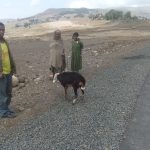We explore the effect of different models of scalable nutrition services embedded within a light-touch graduation program implemented at scale in Ethiopia. The graduation program provided poor households enrolled in Ethiopia’s national safety net, the Productive Safety Net Program, with additional livelihood programming including savings groups and agricultural and livestock value-chain training. In addition, extremely […]
Buyers’ response to third-party quality certification: Theory and evidence from Ethiopian wheat traders
When quality attributes of a product are not directly observable, third-party certification (TPC) enables buyers to distinguish between quality levels and reward sellers accordingly. We study the adoption of TPC by traders in smallholder-based agricultural value chains in low-income countries, where traders aggregate products from many small-scale producers before selling in bulk to downstream processors. […]
Healthy diets and the role of micro, small, and medium enterprises: Examining Ethiopia’s food environment
Micro, small, and medium enterprises (MSMEs) play an important role in the food environment in many low- and middle-income countries. But there is little systematic knowledge about the opportunities they have and constraints they face in trying to grow their businesses. To contribute to building this knowledge base, we draw upon linked household–enterprise surveys collected […]
Rural income diversification in Ethiopia: Drivers and welfare impact
Diversification of rural households into the nonfarm economy is a key driver of economic growth and structural transformation in countries where agriculture remains the primary source of livelihood. This study examines trends and patterns of income diversification, its determinants, and its association with household welfare in rural Ethiopia. Our analysis indicates that rural households in […]
Graduating from Ethiopia’s Productive Safety Net Programme: What have we learned?
Ethiopia’s Productive Safety Net Programme (PSNP) – one of the largest social protection programs in Africa – has improved food security and strengthened recovery from shocks, yet it has achieved limited progress in raising incomes or diversifying livelihoods. In response, policymakers have layered graduation models onto the PSNP to promote sustainable self-reliance. This note synthesizes […]
- « Previous Page
- 1
- 2
- 3
- 4
- 5
- 6
- …
- 123
- Next Page »




